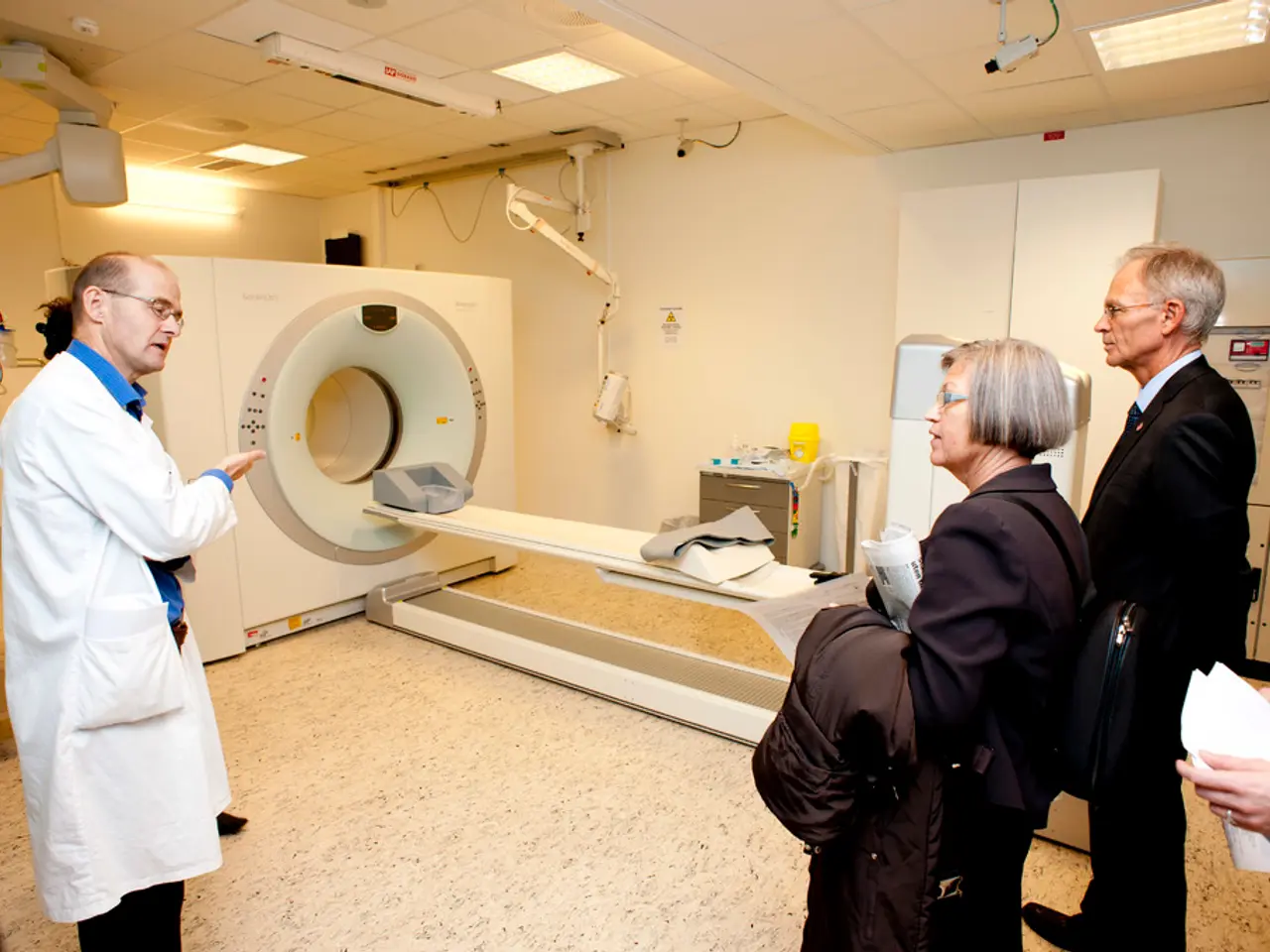Colon Examination Beyond Age 50: Essential Information
In the fight against colorectal cancer, regular screenings play a crucial role. Here's a breakdown of the latest recommendations from the U.S. Preventive Services Task Force (USPSTF) for colorectal cancer screening.
For adults aged 45 to 75, the USPSTF recommends a colonoscopy every 10 years as the preferred method for colorectal cancer screening. This interval is applicable to individuals at average risk, those without a personal or family history of colorectal cancer or precancerous polyps, and without genetic or inflammatory bowel disease risk factors [1][2][5].
The decision for screening in those over 75 should be individualized based on health status and prior screening history. Other screening options, such as annual stool testing and sigmoidoscopy every 5 years, are also endorsed by the USPSTF, but colonoscopy every 10 years offers a high degree of validity [1][5].
The aim of starting screening at age 45 instead of 50 is to detect colorectal cancer earlier and reduce mortality, given the rising rates of early-onset colorectal cancer [3].
A colonoscopy involves using a colonoscope to examine the entire colon and rectum. During the procedure, medical professionals can identify abnormal findings and remove any lesions simultaneously [6]. Biopsy of suspicious-looking areas can also be performed using special instruments [7].
While colonoscopies are generally safe, there are associated risks. These include negative reactions to anesthesia, internal bleeding from an area where tissue or a polyp was removed, and tear or injury to the colon [7]. Death during a colonoscopy is very rare.
People with a family history of bowel conditions, a higher risk for developing colon cancer, or a history of polyps or colon cancer may require alternative testing in addition to a colonoscopy [8]. Those who have undergone radiation therapy on the abdomen or pelvic area may need colorectal cancer screening, including a colonoscopy, 5 years after the treatment ended [9].
For individuals with an increased risk of cancer, such as those with ulcerative colitis or Crohn's disease, follow-up colonoscopies every 1-3 years may be necessary [10].
A colonoscopy can provide assurance for individuals and allow any issues to be monitored and treated quickly. It's essential for people ages 50-75 with an average risk for colon cancer to get routine colonoscopies every 10 years for cancer screening [4].
Remember, these guidelines are general and may not apply to everyone. Always consult with your doctor to discuss your personal colorectal cancer screening options and schedule.
References:
- USPSTF Recommendation Statement: Colorectal Cancer: Screening
- Colorectal Cancer Screening: What's New in 2018
- Colorectal Cancer in Younger Adults
- Colorectal Cancer Screening Guidelines: What's New for 2021
- Colorectal Cancer Screening: What's New in 2021
- Colonoscopy: What to Expect
- Colonoscopy: Risks
- Colorectal Cancer: Risk Factors
- Colorectal Cancer Screening After Radiation Therapy
- Colorectal Cancer: Screening and Prevention
- Science advances our understanding of colorectal cancer, revealing the importance of screening for early detection.
- Regular screening testing is a critical component of workplace-wellness programs to combat colorectal cancer in employees.
- Medical-conditions and chronic diseases, such as colorectal cancer, can be managed with proper attention to personal health and wellness.
- Fitness and exercise, along with a balanced diet, contribute to maintaining digestive health and reducing the risk of colorectal cancer.
- Eye-health, hearing, and overall health-and-wellness are interconnected, with regular check-ups and screenings ensuring a long, healthy life.
- Sexual-health awareness is essential for maintaining a complete understanding of one's overall health and the potential impact on colorectal cancer risk.
- Autoimmune-disorders and other health complications can affect the digestive system and raise the risk of developing colorectal cancer.
- Climate-change could impact the incidence and spread of colorectal cancer due to changes in lifestyle, diet, and exposure to pollutants.
- Mental-health plays a significant role in contending with diagnostic tests and treatments, including colorectal cancer screenings.
- Prioritizing mens-health includes focusing on colorectal cancer screenings, regular check-ups, and addressing concerns regarding the disease.
- Skin-care is vital for overall health, but it's also essential to monitor skin conditions during colonoscopy procedures.
- Therapies-and-treatments, including immunotherapy and targeted treatments, are continuously evolving for colorectal cancer cases.
- Proper nutrition is crucial in cancer prevention, especially for those at an increased risk of colorectal cancer.
- The aging process brings new challenges to health, requiring strategies such as regular screenings for colorectal cancer.
- Womens-health encompasses various aspects, including colorectal cancer screening, management, and awareness.
- Parenting is about ensuring the health of both parent and child, with regular screenings such as colorectal cancer being a part of that process.
- Weight-management is essential for maintaining cardiovascular health, reducing the risk of colorectal cancer, and overall wellbeing.
- The industry of health-care continues to innovate with new screenings and treatments for colorectal cancer, such as non-invasive tests and locating potential vaccines.
- Medicare recipients should be aware of the options for colorectal cancer screenings and their entitlements regarding reimbursement.
- CBD products and their potential effects on colorectal cancer are the subject of ongoing research and debates in the scientific community.
- Neurological-disorders, including their impact on digestion and the risk of colorectal cancer, necessitate regular monitoring and screening.
- Environmental-science research highlights the connection between pollution and healthcare issues, such as colorectal cancer.
- Finance plays a role in accessing screenings and treatments for colorectal cancer, with various options for managing the associated costs.
- Skin-conditions can present challenges in colonoscopies, leading to necessary considerations in preparation and monitoring.
- Space-and-astronomy research may facilitate advancements in technologies used for colorectal cancer screenings and treatments.
- Cybersecurity measures protect sensitive patient data during colorectal cancer screenings, ensuring privacy and data integrity.
- Lifestyle choices, including diet, exercise, and regular screenings, influence colorectal cancer risk and overall health.
- Fashion-and-beauty trends can affect self-care routines and hesitance for going through a colonoscopy examination.
- Food-and-drink recommendations can help manage weight, reduce the risk of colorectal cancer, and promote overarching health-and-wellness.




